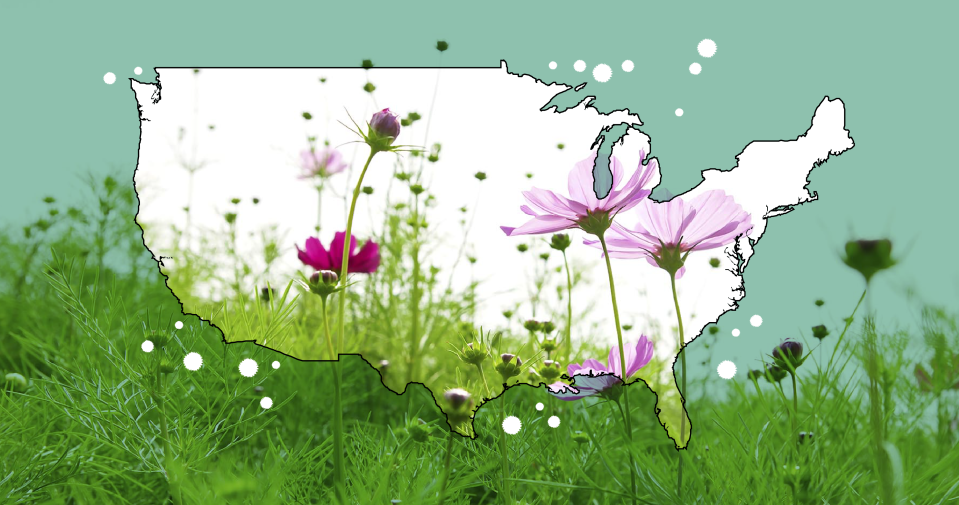Allergy symptoms getting worse every year? It’s not just you. Here's why:
Suffering more than usual this year from the itchy, sneezy, congested misery of seasonal allergies?
You're not alone. But you may have a harder time finding relief, some researchers say.
Warming global temperatures have caused longer pollen seasons and more potent allergens across North America in recent decades, and those worsening effects has been more apparent in places like Iowa, where weeds, trees and crops are abundant.
More: See the celebrations as the Tulip Time 2023 festival blooms in Pella, Iowa
For some, over-the-counter meds aren't cutting it anymore
As a result of the worsening pollen season, allergy sufferers are less likely to find relief from over-the-counter medications and may need to turn to their doctor for more help.
But that's not easy. A new report from the Asthma and Allergy Foundation of America says Des Moines is one of the worst places for allergy sufferers — not because of high pollen counts, but because of the lack of availability of allergy specialists.
Des Moines has relatively few allergists and immunologists
According to the 2023 Allergy Capitals report published last month, Des Moines ranks as the ninth-worst city in the U.S. for allergies because of its poor rate of board-certified allergists and immunologists per patient, said Hannah Jaffee, research manager at the Asthma and Allergy Foundation of America.
The report also ranked cities based on average daily pollen counts and use of over-the-counter allergy medications. Des Moines had a worse-than-average score for tree pollen, based on data collected from the year before, Jaffee said.
Allergy testing recommended to tailor treatment
Allergy and immunology specialists like Dr. Jennifer Petts and Dr. Javen Wunschel at The Iowa Clinic conduct allergy testing to understand exactly what environmental allergen is triggering symptoms in patients. They say this finding helps them come up with individualized plans to alleviate symptoms.
In addition to allergy shots and other prescriptions, they can also offer other recommendations to lessen symptoms, such as installing an air filter. But the key is getting testing, they said.
“How do you know if you should do dust mite avoidance measures if you’re allergic to dust mites?" Wunschel said. "We want our patients to have a good quality of life, to be out there enjoying the season, not be a hermit and shut up inside.”
Climate change has lengthened pollen season
Research has shown major indicators of human-caused climate change — such as higher levels of ground ozone, warmer temperatures and extreme weather events — all have a direct effect on pollen product, Jaffee said.
One study found over the past 30 years, pollen season has lengthened by approximately 20 days across North America.
“Over the course of 20, 30 years, as climate changes get worse and warming temperatures continue, that leaves more time for pollen production. So we see allergy season, when plants are actually producing pollen, those are starting earlier and ending later," Jaffee said.
Pollen grains are now more allergenic
The study, which analyzed data from dozens of pollen count stations between 1990 and 2018, also found pollen concentrations increased by 21 percent over that time.
“The pollen grains themselves are actually becoming more allergenic," Jaffee said. "So not only are pollen seasons getting longer, but they’re getting worse as well.”
It all adds up to misery for millions of Americans
Doctors and scientists say it's been bad news for the more than 60 million people in the U.S. that suffer from seasonal allergies, according to the Centers for Disease Control and Prevention.
Petts say she and Wunschel are seeing patients making appointments earlier in the season every year. For some, higher pollen and mold counts have meant the over-the-counter medications they've relied on for years are no longer as effective.
Seasonal allergies can impact other conditions
Worsening allergies can also trigger people's asthma or cause other respiratory conditions, such as sinus infections.
“Now, because the counts are so much higher, they’re noticing that that’s just not enough," Wunschel said.

Allergy impacts are worse in cities
The impacts of worsening allergy season, along with many other health impacts, have been felt more acutely in urban centers, according to the Asthma and Allergy Foundation of America.
Lack of greenspace in urban areas leads to an "urban heat island" effect, which occurs when metropolitan areas have higher temperatures than their surrounding areas because of their infrastructure and population density.
Warmer daytime and nighttime temperatures lead to more pollen production, meaning urban dwellers can suffer more allergy symptoms than those living in rural areas, Jaffee said.
Pollen season is forecast to get even worse
Recent research has shown pollen season across the country will continue to get worse as a result of climate change, highlighting the importance of taking action in order to mitigate the long-term implications of worsening allergy season, along with many other health impacts, Jaffee said.
Michaela Ramm covers health care for the Des Moines Register. She can be reached at mramm@registermedia.com, at (319) 339-7354 or on Twitter at @Michaela_Ramm.
This article originally appeared on Des Moines Register: Allergy season has been getting worse. Why that's bad news for Iowans.

